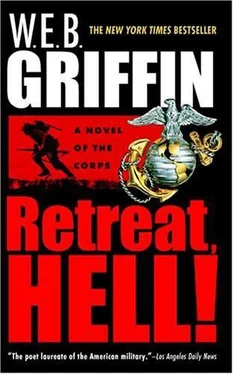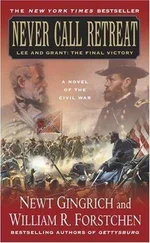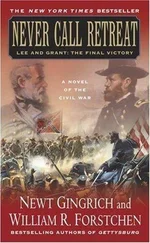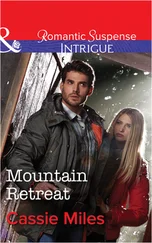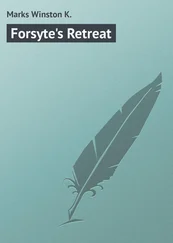The invasion was a spectacular success.
At 1200 29 September — two weeks after the landing — MacArthur stood in Seoul's National Assembly Hall and told South Korean President Syngman Rhee,
".. . On behalf of the United Nations Command, I am happy to restore to you, Mr. President, the seat of your government. ..."
MacArthur then led the assembled dignitaries in recitation of the Lord's Prayer.
The Eighth Army had broken out of the Pusan Perimeter. The North Korean Army was in full retreat.
It was logical to presume that the Korean War was over.
Chapter One
[ONE]
Near Chongju, South Korea
0815 28 September 195O
Major Malcolm S. Pickering, USMCR, whose appearance and physical condition reflected that he had not had a change of clothing—much less the opportunity to bathe with soap or shave—since he had been shot down fifty-eight days before sat between two enormous boulders near the crest of a hill.
He thought—but was by no means sure—that he was about twenty miles north of Taejon and about thirty miles south of Suwon. Where he hoped he was, was in a remote area of South Korea where there were few North Korean soldiers, lessening the chance that he would be spotted until he could attract the attention of an American airplane, and have someone come and pick him up.
Those hopes were of course, after fifty-eight days, fading. Immediately after he had been shot down, there had been a flurry of search activity, but when they hadn't found him the activity had slowed down, and—logic forced him to acknowledge—finally ceased.
He wasn't at all sure that anyone had seen any of the signs he left after the first one, the day after he'd been shot down. What he had done was stamp into the mud of a drained rice paddy with his boots the letters PP and an arrow. No one called him "Malcolm." He was called "Pick" and he knew that all the members of his squadron—and other Marine pilots—would make the connection.
The arrow's direction was basically meaningless. If the arrow pointed northward, sometimes he went that way. More often than not, he went east, west, or south. He knew that he couldn't move far enough so that he wouldn't be able to see an airplane searching low and slow for him in the area of the sign left in the mud.
He had left other markers every other—or every third—day since he'd been ·on the run. The fact that there had been Corsairs flying low over some of the markers—logic forced him to acknowledge—was not proof that they had seen the markers. The Corsairs, when they were not in direct support of the Marines on the ground, went on combined reconnaissance and interdiction flights, which meant that they were flying close to the deck, not that they had seen his markers.
It was too risky to stay in one place, so he had kept moving. He'd gotten his food—and an A-Frame to carry it in—from South Korean peasant farmers, who were anxious to help him, but made it clear they didn't want anyone to know—either the North Korean military or a local Communist—that they had done so. In either case, they would have been shot.
He was, of course, discouraged. Logic forced him to acknowledge that sooner or later, he was going to be spotted by North Koreans, or by someone who would report him to the North Koreans. And if they found him, he would be forced to make a decision that was not at all pleasant to think about.
It wasn't simply a question of becoming a prisoner, although that was an unpleasant prospect in itself. Three times since he had been on the run he had come across bodies—once, more than thirty—of U.S. Army soldiers who, having been captured and after having their hands tied behind them with commo wire, had been summarily executed and left to rot where they had fallen.
If the North Koreans spotted him, and he could not get away, he was going to die. Not with his hands tied behind his back, but very probably by his own hand, unless he was lucky enough to go down with .45 blazing, a la John Wayne. Logic forced him to acknowledge that was wishful thinking, that he couldn't take the risk of going out in a blaze of glory, that he would have to do it himself.
Major Pickering's father was Brigadier General Fleming Pickering, USMCR, who was the Deputy Director of the Central Intelligence Agency for Asia. For obvious reasons, young Pickering could not allow himself to fall into North Korean hands.
It was sort of a moot question anyway. With only five rounds left for the .45, he couldn't put up much of a fight with two North Koreans, much less a platoon of the bastards, or a company.
The hilltop was bathed in bright morning sunlight, the rays of which had finally warmed Major Pickering—it had been as cold as a witch's teat during the night—but had not yet warmed the ground fog in the valley below enough to burn it off.
That meant that Major Pickering could not see what he was looking for, even through the 8x35 U.S. Navy binoculars he had somewhat whimsically— if, as it turned out, very fortuitously—"borrowed" from the USS Badoeng Strait just before taking off.
The rice paddy in the valley where he had stamped out the last marker in the mud was covered with ground fog.
He set the binoculars down and went into the bag tied to the A-Frame. There was what was left of a roasted chicken carcass and the roasted rib cage of a small pig. Surprising Major Pickering not at all, both were rotten to the point where trying to eat any of it would be gross folly.
After thinking it over carefully, he decided he would bury the rotten meat before breakfast. He dug a small trench with a K-bar knife and did so, and then went back into the A-Frame bag and took from it three balls of cold rice. The smell they gave off was not appealing, but it was not nausea-inducing, and he popped them one at a time into his mouth and forced them down.
That was the end of rations, which meant that he would have to get some food today. That meant tonight. What he would do was come off the hill, very carefully, and look for some Korean farmer's thatch-roofed stone hut. When he found one, he would keep it under surveillance all day and go to it after dark, entering it with .45 drawn and hoping there would be food offered, and that the farmer would not send someone to report the presence of an American the moment he left.
So far, food had been offered and North Korean troops had not come looking for him at first light. So far, he had been lucky. Logic forced him to acknowledge that sooner or later everybody's luck changed, most often for the worse.
When he drank from his canteen—he had two—he drained it, which meant that when he found a Korean farmer's house and more or less threw himself on their mercy, he would have to stick around long enough to boil water to take with him.
He picked up the binoculars and trained them again on the rice paddy below. The fog had burned off somewhat in the area; he could see the dirt path—it didn't deserve to be called a road—leading to it, but not the rice paddy itself.
"Oh, shit," he said aloud.
Two vehicles were just visible on the path.
They had to be North Koreans. It was entirely possible that these were the first two motorized vehicles ever to move down the path used by ox-drawn carts.
"I'm losing my fucking mind," he said softly, but aloud.
The two vehicles were a jeep and a three-quarter-ton weapons carrier. A large American flag was affixed to the tall antenna rising from the rear of the jeep.
He took the binoculars from his eyes, then squinted his eyes and rolled them around, and then raised them again, hooking the eyepieces under the bone at his eye sockets.
Читать дальше
